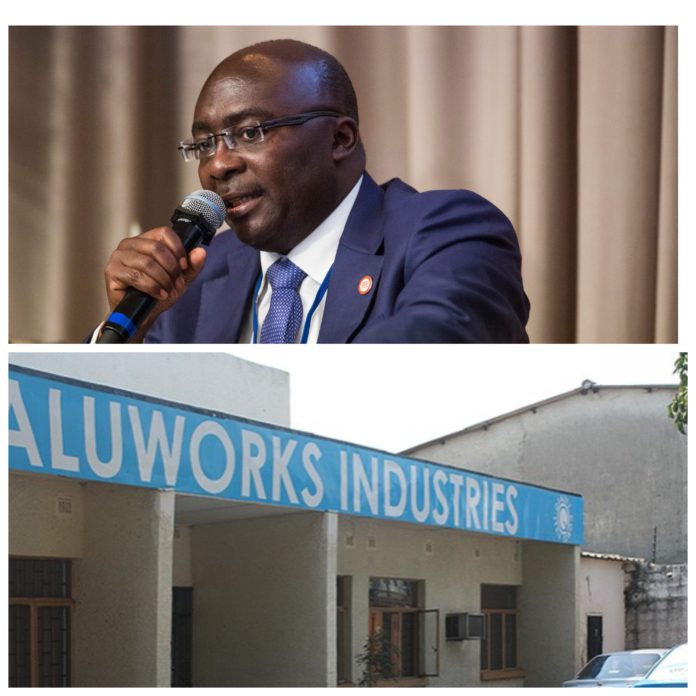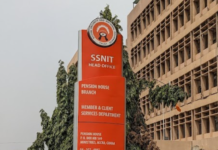
The attempt by the Vice President, Dr Mahamudu Bawumia to save Aluworks PLC from collapse has failed as the company’s shutdown has entered the 20th month, Adomonline.com can exclusively reveal.
According to our sources, Aluworks’ continuous closure continues despite a directive from the Vice President that the company re-start work by December 2022.
It’s been about one year since that directive but the workers of Aluworks have remained at home with deep-throat sources attributing the failure to restart work to the slow pace of negotiations with SSNIT.
Aluworks PLC is a company owned by the Social Security and National Insurance Trust (SSNIT) as a majority shareholder with a shareholding of 62%.
The company has, however, been on its knees since 2015 when SSNIT stopped investing in the entity due to a series of recapitalization efforts that have not yielded the desired results.
Our sources say, Caitlyn, the second biggest shareholder, expressed interest in taking majority shares in the company to recapitalize and restructure the entity.
But, even though SSNIT had agreed in 2019 to the recapitalization proposal by Caitlyn, it pulled the plugs much to the dismay of workers and other stakeholders of the company.
The refusal meant that Aluworks’ recapitalization and restructuring did not materialize
A recapitalization and restructuring of Aluworks PLC would mean Caitlyn would’ve taken over the company’s management.
In 2022 when Aluworks PLC had almost collapsed, however, SSNIT called Caitlyn to the negotiation table, our sources say.
As a result of the slow-paced nature of the negotiations, Aluworks PLC eventually shut down in 2022.
Despite the above, officials of Caitlyn submitted a Memorandum of Understanding (MoU) to SSNIT in which they proposed investing GHC 5 million to get the company working again, pending two issues.
The two outstanding issues explained by our sources are the transaction share price to issue new shares and the negotiation of how to restructure old debts owed to SSNIT by Aluworks.
Workers dying
While the negotiations have been tortuously slow, the result is death for many Aluworks workers who have remained at home since the 19-month closure of the company.
Workers have not received any salaries in these 19 months, jeopardizing livelihoods and depriving hundreds of families of the basic needs of life.
Many workers, we are told, have been ejected by their landlords for non-payment of rent. Many have also had their wards drop out of school amid issues of broken homes and building unsustainable levels of debt for the affected workers.
To top it all is the fact that medical services to the employees have ceased due to unpaid debts owed by Aluworks to prescribed hospitals where the company’s staff receive their medical care.
Per our checks at Aluworks, SSNIT quotation of Aluworks’ price-per-share at 99 pesewas after the company had shut down, a value that is more than twice the share price (42 pesewas) of Aluworks when it was in operation in 2019.
The share price quotation by SSNIT, we are told, has accounted for the slow pace of the negotiations.
Investment experts have raised questions about SSNIT’s posturing in the negotiations as they feel the state parastatal is shooting itself in the foot by not fast-tracking the takeover process.
One such investment expert asked: “Wouldn’t it be more prudent for SSNIT to become the 2nd majority shareholder in a company in operation than having 62% majority shares in a dead company”?
Even more revealing is the majority shareholder, SSNIT’s refusal to hand over its majority shareholding to Caitlyn in 2019.
Had SSNIT engaged in this handing over of majority shares, the company would have avoided its current deplorable state and its attendant effect on the many distressed workers suffering with their families.
As it stands, some assets of Aluworks, especially machinery and other equipment are wasting away amid building security issues on the company’s premises.
SSNIT response
SSNIT has denied ever receiving any directives from the Vice President that the company open even as negotiations continue, saying it did not know about such directives.
SSNIT, however, confirmed that there was a meeting with the government’s Economic Management Team which considered the company’s predicament and reached a consensus that ongoing discussions with the potential strategic investor should proceed.
According to SSNIT, contrary to speculations, it has not rejected any proposals from other companies, emphasizing that a sum of GHS5 million is insufficient to revive operations.
Aluworks PLC, SSNIT stated, requires a more substantial amount of working capital to resume operations and settle outstanding debts.
SSNIT said it was hopeful for a swift conclusion to negotiations with the strategic investor to expedite the turnaround of Aluworks even though it did not state any timelines.
“Shareholders decided to close the company and place it under care and maintenance as the company was in financial distress. It is hoped that a speedy conclusion of the negotiations with the strategic investor will improve the fortunes of the company and the workers,” the official response from SSNIT said.
SSNIT also clarified that it is not divesting any of its shares in the company, explaining that all shareholders had unanimously endorsed the pursuit of a private placement with a strategic investor.
According to SSNIT, once the negotiations end, the ownership stakes of existing shareholders will undergo dilution, enabling the strategic investor to assume the role of the majority shareholder post-placement.
Negotiations, they added, were in advanced stages, with SSNIT, acting on behalf of all shareholders, having extended a final offer to the prospective strategic investor.
The finalization of the deal hinges on the awaited response from the strategic investor.
SSNIT also said it was in acknowledgment of the challenges faced by the workforce that the shareholders decided to close the company and place it under care and maintenance due to financial distress.
The SSNIT response also added that optimism lies in the swift conclusion of negotiations with the strategic investor, which is anticipated to enhance the company’s prospects and benefit its employees.






